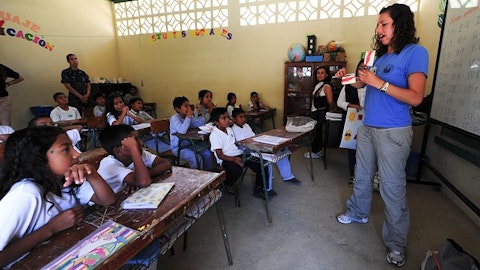Stephen Kramer: Sure. Thanks, Toni. So I think that we are still early in that curve. ARPA ended September of 2023. We have always sort of forecasted that this would be sort of a 12 to 24 months from the end of ARPA before owners started really making either decisions or different decisions than they otherwise would have made. I would say in terms of being really specific about the acquisition pipeline, I would say that we continue to cultivate those relationships. We continue to look at some smaller opportunities, especially where we are looking to densify near high-performing centers. And so overall, it’s definitely a part of the growth algorithm. Although again, at this point, we continue to be very focused on continuing to enroll within our existing centers and moving ahead on that front.
Toni Kaplan: Super. Thanks.
Operator: Next question, Jeff Silber with BMO Capital Markets. Please go ahead.
Jeff Silber: Thanks so much. You talked a little bit about what you’re doing from a labor perspective in the UK. I’m just curious if you can address what’s going on in the U.S. in terms of labor supply availability and wage inflation?
Stephen Kramer: Yes. So I would start by saying we’re really pleased with the retention rates that we are achieving here in the U.S. So again, in the depths of COVID, that was a real challenge in terms of our ability to retain and therefore, the need to attract more new staff to Bright Horizons so we still continue at a level that is stronger than what we enjoyed even in 2019. So for me, any conversation around talent starts with retention and feel really good about where we are from that perspective. In terms of the labor market, there are still pockets of – sort of heat pockets in the country where it is still challenging to recruit the full complement of staff that we would like to have. On the other hand, broadly, we feel good about the progress that we continue to make here in the U.S. And then in terms of wage rates, I think that we feel really differently than we felt again in the depths of COVID when we needed to accelerate wages in a more significant way.
It feels like we are now in a place where we are paying really competitively and therefore, at this point, expect that wage increases will be much more in line with what we had seen previously as opposed to significant stepped-up basis that we incurred in the depths of COVID.
Jeff Silber: Okay. That’s helpful. There was an earlier question about center closures and forgive me if I missed the answer, but I think the question was about your goal for center closures this year. I think you had previously said it will be the same as last year. Is that still the same? And are they skewed to any specific geography? And if they’re more in the U.S., is there any specific region? Thanks.
Elizabeth Boland: Yes. So we would still expect to be in the range of what we closed in 2023. We closed 49 centers last year, so still in that range. Some disproportionate skewed to the UK could be – the UK is not 40% of our overall business, but they certainly could be 40%, 45% of those closures. But there are still some underperformers in the U.S. that we are looking at addressing in the same way that we’ve talked about rationalizing the portfolio in the UK. So those are the two geographies where we’re seeing the more outsized closures. And that – there’s no particular – we closed 11 this quarter, so there’s a cadence that we’re following that gets overall performance when the leases are up, what we can exit and the timing of all that prepared.
Jeff Silber: Okay. That’s really helpful. Thanks so much.
Elizabeth Boland: Thank you.
Stephen Kramer: Excellent. All right. Well, thank you all very much for your time. We appreciate it, and look forward to seeing you soon.
Elizabeth Boland: Thanks, everyone. Have a good night.
Operator: This concludes today’s teleconference. You may disconnect your lines at this time, and thank you for your participation.
Follow Bright Horizons Family Solutions Inc. (NYSE:BFAM)
Follow Bright Horizons Family Solutions Inc. (NYSE:BFAM)
Receive real-time insider trading and news alerts





